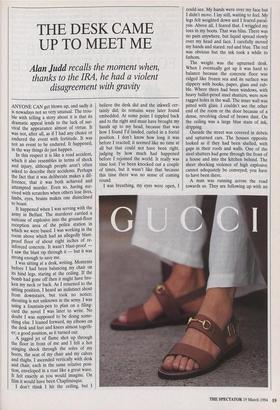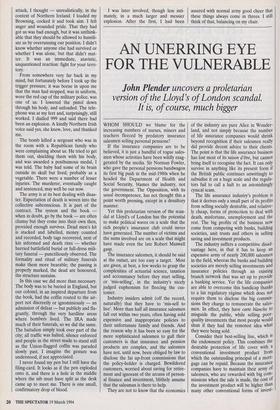THE DESK CAME UP TO MEET ME
Alan Judd recalls the moment when, thanks to the IRA, he had a violent
disagreement with gravity
ANYONE CAN get blown up, and sadly it is nowadays not so very unusual. The trou- ble with telling a story about it is that its dramatic appeal lends to the luck of sur- vival the appearance almost of virtue. It was not, after all, as if I had any choice or endured the event with fortitude. It was not an event to be endured. It happened, in the way things do just happen. In this respect it is like a road accident, which it also resembles in terms of shock and injury, although people aren't often asked to describe their accidents. Perhaps the fact that it was deliberate makes a dif- ference, that it was both achieved and attempted murder. Even so, having sur- vived with scratches when others lose lives, limbs, eyes, brains makes one disinclined to boast.
It happened when I was serving with the army in Belfast. The murderer carried a suitcase of explosive into the ground-floor reception area of the police station in which we were based. I was working in the room above which had an allegedly blast- proof floor of about eight inches of re- inforced concrete. It wasn't blast-proof I saw the blast rip through it — but it was strong enough to save me. I was sitting at a desk, writing. Moments before I had been balancing my chair on its hind legs, staring at the ceiling. If the bomb had gone off then it might have bro- ken my neck or back. As I returned to the sitting position, I heard an indistinct shout from downstairs, but took no notice; shouting is not unknown in the army. I was using a fountain-pen to plan on a filing- card the novel I was later to write. No doubt I was supposed to be doing some- thing else. I leaned forward, my elbows on the desk and feet and knees almost togeth- er; a good position, as it turned out. A jagged jet of flame shot up through the floor in front of me and I felt a hot stinging shock through the soles of my boots, the seat of my chair and my calves and thighs. I ascended vertically with desk and chair, each in the same relative posi- tion, enveloped in a roar like a great wave. It felt exactly as you would imagine. On film it would have been Chaplinesque.
I don't think I hit the ceiling, but I believe the desk did and the inkwell cer- tainly did; its remains were later found embedded. At some point I toppled back and to the right and must have brought my hands up to my head, because that was how I found I'd landed, curled in a foetal position. I don't know how long it was before I reacted; it seemed like no time at all but that could not have been right, judging by how much had happened before I rejoined the world. It really was time lost. I've been knocked out a couple of times, but it wasn't like that because this time there was no sense of coming round.
I was breathing, my eyes were open, I could see. My hands were over my face but I didn't move. I lay still, waiting to feel. My legs felt weighted down and I feared paral- ysis. Above all, I feared that. I wriggled my toes in my boots. That was bliss. There was no pain anywhere, but liquid spread slowly over my head and face. I carefully moved my hands and stared: red and blue. The red was obvious but the ink took a while to fathom.
The weight was the upturned desk. When I eventually got up it was hard to balance because the concrete floor was ridged like frozen sea and its surface was slippery with books, paper, glass and rub- ble. Where there had been windows, with heavy bullet-proof steel shutters, were now ragged holes in the wall. The inner wall was pitted with glass. I couldn't see the other end of the room or the door because of a dense, revolving cloud of brown dust. On the ceiling was a large blue stain of ink, dripping.
Outside the street was covered in debris and upturned cars. The houses opposite looked as if they had been shelled, with gaps in their roofs and walls. One of the steel shutters had gone through the front of a house and into the kitchen behind. The sheer shocking violence of high explosive cannot adequately be conveyed; you have to have been there.
A man was running across the road towards us. They are following up with an attack, I thought — unrealistically, in the context of Northern Ireland. I loaded my Browning, cocked it and took aim. I felt anger and wounded pride. That they had got us was bad enough, but it was unthink- able that they should be allowed to humili- ate us by overrunning our position. I didn't know whether anyone else had survived or whether I was alone, but that didn't mat- ter. It was an immediate, atavistic, unquestioned reaction: fight for your terri- tory.
From somewhere very far back in my mind, but fortunately before I took up the trigger pressure, it was borne in upon me that the man had stopped, was in uniform, wore the red cap of the military police, was one of us. I lowered the pistol down through his body, and unloaded. The tele- phone was at my feet and, surprisingly, still worked. I dialled 999 and said there had been an explosion. A kindly Northern Irish voice said yes, she knew, love, and thanked me.
The bomb killed a sergeant who was in the room with a Republican family who were complaining about us. He tried to get them out, shielding them with his body, and was awarded a posthumous medal, I was told. The baby had some of its brain outside its skull but lived, probably as a vegetable. There were a number of lesser injuries. The murderer, eventually caught and sentenced, may well be out now.
The army is at its best dealing with disas- ter. Expectation of death is woven into the collective subconscious. It is part of the contract. The system and the book when in doubt, go by the book — are often clumsy but they come into their own then, provided enough survives. Dead men's kit is stacked and labelled, money counted and recorded, body tags recovered, next of kin informed and death rites — whether hurried battlefield burial or full-dress mili- tary funeral — punctiliously observed. The formality and ritual of military funerals make them more bearable; the passing is properly marked, the dead are honoured, the structure sustains.
In this case we did more than necessary. The body was to be buried in England, but our colonel, in an inspired departure from the book, had the coffin routed to the air- port not discreetly or ignominiously — an admission of defeat — but publicly and fla- grantly, through the very hardline areas where bombers lived. The IRA made much of their funerals, so we did the same. The battalion simply took over part of the city; all traffic was halted, silence enforced and people in the street made to stand still as the Union-flagged coffin was paraded slowly past. I imagine the gesture was understood, if not appreciated.
I never found my pen but I still have the filing-card. It looks as if the pen exploded onto it, and there is a hole in the middle where the nib must have split as the desk came up to meet me. There is one small, confirmatory drop of blood. I was later involved, though less inti- mately, in a much larger and messier explosion. After the first, I had been assured with normal army good cheer that these things always come in threes. I still think of that, balancing on my chair.



























































 Previous page
Previous page